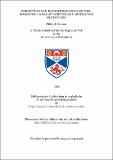Perception and recognition of computer-enhanced facial attributes and abstracted prototypes
Abstract
The influence of the human facial image was surveyed and the nature of its many interpretations were examined. The role of distinctiveness was considered particularly relevant as it accounted for many of the impressions of character and identity ascribed to individuals. The notion of structural differences with respect to some selective essence of normality is especially important as it allows a wide range of complex facial types to be considered and understood in an objective manner. A software tool was developed which permitted the manipulation of facial images. Quantitative distortions of digital images were examined using perceptual and recognition memory paradigms. Seven experiments investigated the role of distinctiveness in memory for faces using synthesised caricatures. The results showed that caricatures, both photographic and line-drawing, improved recognition speed and accuracy, indicating that both veridical and distinctiveness information are coded for familiar faces in long-term memory. The impact of feature metrics on perceptual estimates of facial age was examined using 'age-caricatured' images and were found to be in relative accordance with the 'intended' computed age. Further modifying the semantics permitted the differences between individual faces to be visualised in terms of facial structure and skin texture patterns. Transformations of identity between two, or more, faces established the necessary matrices which can offer an understanding of facial expression in a categorical manner and the inherent interactions. A procedural extension allowed generation of composite images in which all features are perfectly aligned. Prototypical facial types specified in this manner enabled high-level manipulations to be made of gender and attractiveness; two experiments corroborated previously speculative material and thus gave credence to the prototype model. In summary, psychological assessment of computer-manipulated facial images demonstrated the validity of the objective techniques and highlighted particular parameters which contribute to our perception and recognition of the individual and of underlying facial types.
Type
Thesis, PhD Doctor of Philosophy
Collections
Items in the St Andrews Research Repository are protected by copyright, with all rights reserved, unless otherwise indicated.

